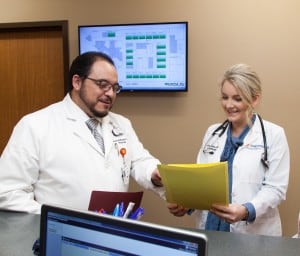Seeing a neurologist might seem like a scary proposition. They’re known for treating major conditions like stroke, epilepsy and dementia.
Maybe you regularly suffer from headaches or migraines. However, you can usually still go about your normal activities. Do you need to see a doctor who deals with diseases of the brain?
Chances are it’s a smart move. A neurologist can improve your quality of life and decrease the number of days you’re in pain.
Jesus Martinez, MD practices general neurology at Regional One Health’s East Campus Multispecialty Care clinic. He has some advice for when patients should get their headaches checked out and what they can expect for treatment and relief.
What does a neurologist treat?
“I see all comers,” Dr. Martinez said. “I can help with headaches, back pain, numbness or tingling, balance problems, and memory problems. I offer treatment and education – why things are happening the way they’re happening, and how to get control of them.”
Headaches are the most common concern he hears about.
They can be debilitating in their own right, so he encourages patients to seek help.
Are my headaches bad enough to see a neurologist?
Dr. Martinez said you should see a neurologist if you answer yes to any of these questions:
- Am I in pain at least three or four times a month?
- Does my headache wake me up at night?
- Is my headache accompanied by numbness or tingling?
What can I expect at my first appointment?
When he meets a new patient, Dr. Martinez first figures out what type of headache they have. Migraines are a big cause of debilitating pain, but aren’t a catch-all. Headaches can also be due to hypertension, hormone imbalances, muscle tension, sinus issues, and other factors.
He’ll ask the following questions:
- What is the quality of the headache? Is it shooting; throbbing?
- Where does the pain start?
- Do other symptoms come with the headache?
- Are sounds or lights painful?
- Does weather have an impact?
- Did the headache start in childhood or the teen years?
- Is there a family history of headaches?
Will I need imaging?
It depends. Dr. Martinez usually orders tests if:
- Symptoms suddenly worsen
- The condition is recent
- An exam points to an abnormality, like better reflexes on one side of the body
The East Campus offers same- or next-day imaging. That means patients don’t have to wait and worry, and Dr. Martinez can start a treatment plan promptly.
What are my treatment options?
For most patients, headaches aren’t a sign of something like a clot or tumor. If they are, Dr. Martinez can refer to a surgeon or another appropriate specialist.
More often, he said, “It’s like allergies or asthma. It’s just the way the person is made, and you need to have a preventative regimen.”
For chronic headaches, treatment can include medication for high blood pressure, hormone imbalances, sinus issues, etc.
Treatments for migraines and tension headaches can be similar.
One option is Botox. It’s administered by the doctor on the face and head to block neurotransmitters that carry pain signals.
A CGRP blocker is another injectible option. They are self-administered in the upper arm, abdomen or thigh to block a protein linked to migraines.
There are medications for the attacks themselves. Options include:
- Caffeine-based products
- Drugs that stimulate serotonin to reduce inflammation and constrict blood vessels
- A short course of steroids
Dr. Martinez helps patients figure out the best option for their specific needs. “We can tailor the medication to the person’s characteristics,” he said.
Dr. Martinez also has the full slate of Multispecialty Services at his disposal.
He said the clinic’s physical therapists and pain specialists can help with headaches, back pain, balance problems, stiffness and stroke. They are available right at the East Campus.

